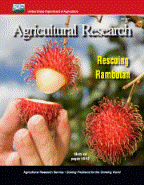United States Department of Agriculture: Agricultural Research Service, Lincoln, Nebraska

Agricultural Research Magazine
Date of this Version
1-2002
Document Type
Article
Citation
Agricultural Research January 2002
Abstract
When people get stressed, they seek relief in many ways. Some exercise, some practice specific breathing techniques, and some eat chocolate. Farm animals become stressed, too. In domesticated food animals, stress can affect meat quality, milk production, and general health. But animal stress must often be intuited from clues such as lower-than-anticipated weights and increased illness.
Certain stressful events can be anticipated, for example, birth and weaning. But how do you know if an animal is stressed for some other reason? Ted H. Elsasser of ARS’ Growth Biology Laboratory in Beltsville, Maryland, is investigating nitrated protein as a biomarker of stress. Nitrated proteins may serve as an early-warning system to point out an animal that may yield unsafe products or flag a need for therapeutic or intervention strategies to promote recovery from illness.
“The biggest problem for animal producers is disease management, so an early warning system would certainly be helpful,” says Elsasser.
Included in
Agriculture Commons, Animal Sciences Commons, Food Science Commons, Plant Sciences Commons

